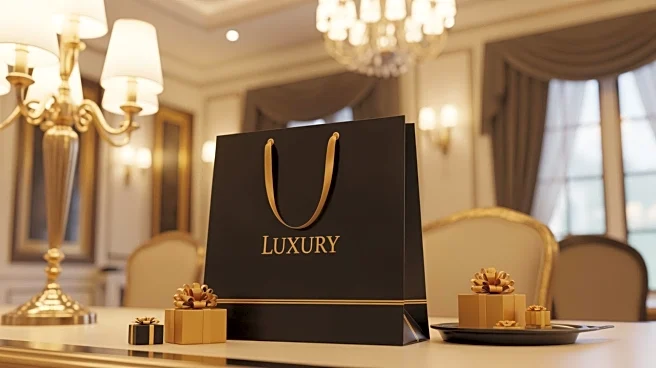What's Happening?
Spain is experiencing a significant surge in luxury shopping tourism, contributing to its economic growth. According to the National Institute of Statistics, approximately 66.8 million international visitors
arrived in Spain in the first eight months of 2025, with each spending an average of €1,457. This represents a 3.6% increase over the previous year. The World Travel & Tourism Council forecasts that tourism will inject over €260 billion into Spain's GDP this year. Luxury shopping tourism is a key driver of this expansion, with Spain ranking as Europe's third-largest luxury market. Cities like Madrid, Barcelona, and Marbella are at the forefront, offering unique luxury experiences that blend local culture with high-end shopping.
Why It's Important?
The rise in luxury shopping tourism in Spain highlights a shift in consumer preferences towards experiences that combine exclusivity, culture, and sustainability. This trend is significant for the U.S. as it reflects broader global economic patterns where luxury spending is increasingly tied to unique and personalized experiences. U.S. businesses in the luxury sector may need to adapt by offering more tailored and culturally immersive experiences to attract affluent international tourists. Additionally, the growth in Spain's luxury market could influence U.S. tourism strategies, encouraging a focus on enhancing luxury offerings to compete globally.
What's Next?
Spain's continued investment in luxury shopping destinations suggests a strategic focus on maintaining its competitive edge in the global luxury market. As demand from regions like Asia, the Middle East, and Latin America grows, Spain is likely to further develop its luxury infrastructure to cater to these markets. U.S. stakeholders in the luxury and tourism industries may observe these developments to identify opportunities for collaboration or to replicate successful strategies in the U.S. market. The emphasis on sustainability and cultural authenticity in Spain's luxury offerings could also inspire similar initiatives in the U.S.
Beyond the Headlines
The evolution of Spain's luxury shopping tourism underscores a broader cultural shift towards valuing experiences over material goods. This trend may have long-term implications for consumer behavior, influencing how luxury brands position themselves in the market. The focus on sustainability and cultural authenticity could drive changes in production and marketing strategies, encouraging brands to adopt more ethical and environmentally friendly practices. As Spain solidifies its position in the global luxury market, it may set new standards for luxury tourism that other countries, including the U.S., will need to consider.








